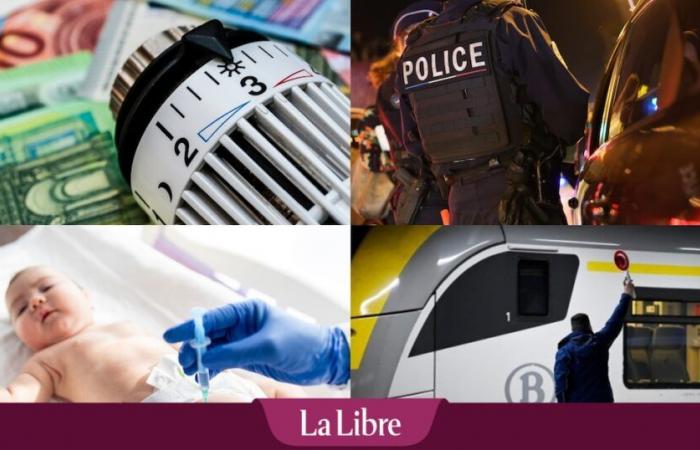
From October 1, the social tariff for electricity will increase by 10%, while that of natural gas and heat will increase by 15% compared to the third quarter.
The social rate is a reduced rate for certain categories of people or households. It is the same for all energy suppliers. The Creg sets the amount each quarter.
SNCB stops the physical sale of international tickets in nine stations
From October 1, SNCB will stop the physical sale of international train tickets in nine stations, namely those of Arlon, Eupen, Ottignies, Brussels-Luxembourg, Antwerp-Berchem, Kortrijk, Hasselt, Mechelen and Ostend.
This decision follows the “continued decline in physical sales of international tickets at the counters”, the railway company justifies itself. From now on, SNCB will limit the physical sale of international tickets to its 12 Travel stores. These points of sale specializing in this type of product are located in the stations of Brussels-Airport-Zaventem, Brussels-Central, Brussels-Midi, Brussels-North, Charleroi-Central, Liège-Guillemins, Mons, Namur, Louvain, Ghent- Saint-Pierre, Antwerp-Central and Bruges. Tickets for cross-border traffic to Roosendaal, Maastricht, Luxembourg, Aachen and Lille, however, remain available via ticket machines and station ticket offices, reassures SNCB.
Technical problems with ticket sales on the SNCB website
The granting of increased intervention becomes automatic for isolated people
Recognition of the status of beneficiary of the increased intervention (BIM) for isolated unemployed people and/or incapacitated for more than 3 months as well as for people recognized as disabled becomes automatic from October 1. This simplified procedure was initially supposed to be launched in April, but was ultimately postponed for six months due to discussions at federal level.
This automation will make the increased intervention, which allows you to pay less for your health care or to benefit from certain social tariffs (energy, internet, public transport, etc.), more accessible. The targeted audiences, who are more financially vulnerable, will no longer have to carry out the first step of the procedure, which will now be automatic.
The mutual societies themselves will be responsible for verifying in advance the income of the people concerned on the basis of the authentic sources available to them for the detection of recent income.
Until now, the BIM status was already automatically offered to people benefiting from the social integration income (RIS), the income guarantee for the elderly (Grapa), the allowance for the elderly (APA), the income replacement allowance for people with disabilities, as well as Mena (unaccompanied foreign minors), orphans and children with disabilities (66% minimum).
Of the more than 2 million people recognized with BIM status in 2021, more than 970,000 automatically benefited from this status.
Infants treated against bronchiolitis from the maternity ward
Babies born from October 1 will already be treated in maternity units against respiratory syncytial virus (RSV), responsible for the majority of bronchiolitis, using a monoclonal antibody injection.
It is also now possible to protect babies born after March 31, 2024 free of charge, if they receive their injection in October. After that, there will be no way to get a refund.
Beyfortus®, a monoclonal antibody, will be available in pharmacies from October and will be reimbursed (moderation fee of 8/12 euros, if in mutual order) for babies up to the age of 6 months.
A single intramuscular injection is sufficient.
Babies whose mothers were vaccinated against RSV during pregnancy are not affected, as are premature babies who received palivizumab (Synagis®). Bronchiolitis is one of the leading causes of hospitalization for toddlers facing their first winter.
Strengthened controls to combat drug driving
The police will be able to more easily subject motorists to a saliva test as part of a drug check from October 1, indicated Federal Minister of Mobility Georges Gilkinet. The checklist of indicators allowing police officers to quickly assess whether a driver is suspected of recent drug use will also be adapted.
One in six drivers tested positive have used several drugs
As part of the drug testing procedure, police officers use a checklist drawn up by experts to assess whether a driver is suspected of having recently used drugs. Currently, a saliva test can only be carried out if three signs of consumption are identified. From now on, in certain cases, a single sign will be enough to carry out a test, such as drug possession, the driver’s confession or a refusal to cooperate.
Furthermore, the checklist will now have a new section allowing you to indicate the signs demonstrating a state of drunkenness or similar to drunkenness. It will thus be possible to prosecute motorists showing signs of recent drug use in court even if the saliva test was not able to detect the substance. This may particularly concern ketamine or synthetic drugs, which are currently not detectable by such saliva tests.
“Zero tolerance against driving under the influence is not a slogan, we intend to fully apply it on the ground,” commented the Minister of Mobility Georges Gilkinet in a press release. “This is especially important since driving under the influence is one of the big three killers on the road, along with distraction and speeding.”
Termination of insurance contracts simplified
Termination of insurance contracts will be simplified for policyholders from October 1. The law establishing these new terms will concern both contracts concluded from this date and current policies.
The notice period for insurance contracts will now be two months, instead of three currently, the new law provides. It will thus be possible for individuals to immediately terminate any policy as long as it has been active for a minimum of one year, and respecting the two-month notice period.
Sending a registered letter for the termination of a contract will no longer be necessary: it will also be possible to carry out this process digitally, by means of an electronic signature (via Itsme for example). In the event of early termination, the policyholder will also benefit from a premium credit.
This reform also provides that consumers can ask their new insurer or broker to carry out the necessary termination formalities for them. The new insurer who is responsible for terminating the policy must, however, guarantee that the policyholder’s coverage continues despite the termination and transfer to another policy.
The reformed B work permit for non-European nationals in the Brussels Region
Work permit B will no longer be issued in the Brussels Region for non-European nationals from October 1st. It will be replaced by short- and long-term work authorizations, indicates the Brussels Economy and Employment regional agency. This change is being made as part of a reform of work authorizations for non-European nationals in the capital region.
From October 1, the short-term authorization will be issued to non-European nationals working in the Brussels Region in the event of working in the territory for a maximum of 90 days out of 180. For more than 90 days, a long-term authorization must be requested. This may be granted for a maximum of three years, for certain job categories. These authorizations will be sent directly to employers, who will be responsible for transmitting them to workers to be able to apply for a visa if necessary.
An unlimited work permit may be issued to employees domiciled in the Brussels Region in the event of a stay of at least 30 months without interruption in Belgium and 30 months of occupation certified by a single permit or a work authorization obtained in the Brussels Region. In the event of a limited-term authorization issued by another Region, the period is extended to four years.
The single permit procedure, however, remains unchanged if the worker stays in Belgium and the duration of work in Belgium is more than 90 days.
Bailiffs agree on simplified fees and present a new calculation tool
Bailiff rates will be changed from October 1st. In their place, “simplified and transparent” prices will be introduced, explains the National Chamber of Bailiffs (CNHJ). The organization has also developed a new tool for calculating these rates online.
Bailiffs intervene when people or companies do not pay their invoices. However, in recent years they have been criticized for charging prices that are sometimes abusive and unclear. The CNHJ, in collaboration with political leaders, has therefore worked to modify these prices. Among the negotiated measures, the recovery of debts relating to basic services such as water, energy, health, telecommunications or school bills will now be at the lowest rate, regardless of the amount of the debt. A solidarity fund, funded by the profession itself, will also be set up to reduce costs.
Bailiffs will henceforth use fixed compensation and apply a recovery fee, fixed from the start of the recovery, without subsequent modification. This should make the breakdown of costs “more transparent”, according to the CNHJ.
The Chamber will also waive the deposit fee, previously due with each repayment under a monthly payment plan. Finally, the costs and acts linked to summons and searches will be replaced by a fixed application fee of 50 euros. In order to verify each amount claimed and ensure that the statement provided by a bailiff is correct, the Chamber of Bailiffs has developed a new online tool on its site, the “tariff-checker”, which will be fully operational on 1 october. The CNHJ specifies that this tool will be updated daily “in the event of new legislation or modification”.
Teachers must submit their career interruption requests online
From October 1, it will be the turn of teachers to have to complete the procedures electronically for any request for career break allowance, time credit or thematic leave. The obligation has been valid since July 1 for other sectors.
A transition period is planned until the end of December for teachers so that they can familiarize themselves with the online procedure.
Concretely, to submit a request to the National Employment Office, you must: inform your employer; the latter completes his part of the benefit application via the Social Security portal; then, it is the worker who completes the request via the Break@work application; and finally, Onem sends its decision to the e-Box.
Valérie Glatigny (MR): “I will propose that the CDI apply to teachers who will take up their duties at the start of the 2027 school year”
Germany tightens regulations on tires in winter conditions
Germany will adapt its regulations relating to tires used in winter conditions from October 1. All-season tires will now only be considered a valid alternative to a winter tire if they bear the Alpine symbol (Three Peak Mountain Snow Flake).
The mountain image with snowflake – the 3PMSF certificate – has been used since 2018 to prove that M+S tires are suitable for winter. If this is not the case, the user faces a fine after October 1 if he or she travels on German roads during winter weather conditions.
Note that there is no defined period for the obligation of winter tires in Germany, it all depends on the weather conditions.





